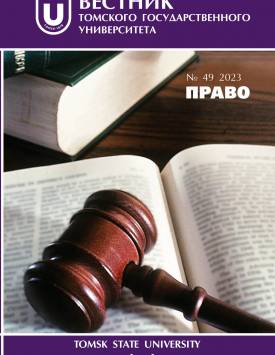Selection of preventive measures on the basis of a court decision
The purpose of the study is to formulate proposals aimed at optimising Chapter 13 of the CPC of the RF "Preventive Measures". In the paper the authors study the procedure for the election of preventive measures by court decision. It is stated that the criminal procedural law has preserved continuity in the approach of legal regulation of the use of preventive measures by the court. Namely, establishing for each of the preventive measures its own legal regime and peculiarities of application. Attention is drawn to the fact that the degree of restriction of the constitutional right to freedom of movement, choice of place of stay and residence (Article 27 of the Constitution of the Russian F ederation) in the election of a preventive measure in the form of a subscription not to leave is much higher than it is perceived by the law enforcer, a comparison of this preventive measure with such as a ban on certain actions is given. The authors note that in the sense of restriction both preventive measures limit the right of a person to freedom of movement, but only one of them is applied by a court decision. The degree of coercive nature in the application of a preventive measure in the form of subscription on not leaving and proper behaviour is associated with the consent of the suspect or accused, there is a certain voluntariness. Such "voluntariness" is often associated, firstly, with the reluctance of the suspect or accused to be subjected to another more stringent preventive measure (i.e. there is a mental influence). When a person is placed on a recognisance and appropriate behaviour bond, there is a direct restriction on the possibility of unimpeded exercise of the right to freedom of movement at any time of its validity. If the person in respect of whom a preventive measure in the form of subscription on not leaving and proper behaviour has been chosen does not want to exercise this right, does not plan to violate the conditions of the preventive measure (to leave the limits of the locality in which he lives), the degree of restriction will remain minimal and not significant for the latter. The possibility of realising the right to movement in this case depends on the discretion of the investigator, inquirer, which also reduces the degree of restriction of the constitutional right. The majority of investigators and inquirers explain the need to maintain the current extrajudicial procedure for the application of the signature on non-departure and proper behaviour by the need to ensure the appearance of the suspect and the accused when summoned to the investigation body and the court. The proposal to replace the signature on not being released and proper behaviour with the application of the Obligation to appear Article 112 of the CPC of the RF causes surprise and rejection without providing any arguments. In conclusion, the authors concluded that the existing approach of dividing the procedure of application of preventive measures into judicial and extrajudicial procedure does not meet the modern understanding of the constitutional rights of the individual and the requirements to ensure them. When a preventive measure is imposed, regardless of the degree of restriction, the very right of the individual to freedom is restricted. This right can be restricted only on the basis of a court decision. The authors declare no conflicts of interests.
Keywords
preventive measures, judicial procedure, degree of restriction, constitutional lawAuthors
| Name | Organization | |
| Baranov Alexander M. | Omsk Academy of the Ministry of Internal Affairs of Russia | baranowam@list.ru |
| Tkacheva Ekaterina S. | Omsk Academy of the Ministry of Internal Affairs of Russia | ektkacheva92@mail.ru |
References

Selection of preventive measures on the basis of a court decision | Tomsk State University Journal of Law. 2023. № 49. DOI: 10.17223/22253513/49/2
